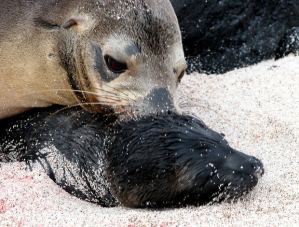
Photo by Sean McCann via Flickr
 Two Paws Down!
Two Paws Down!
To Texas Governor Rick Perry and the State of Texas Legislature for passing HB 716, the “pork chopper bill”, allowing the aerial slaughter of feral pigs and coyotes, and to the Texas Department of Agriculture for declaring October “Hog Out Month” with a statewide contest including $60,000 in awards for the counties that kill the most pigs.
Texas Governor Rick Perry recently signed House Bill 716 into law, legalizing the aerial slaughter of coyotes and feral pigs as of September 1st. The new bill allows anyone with landowner permission and a hunting license to rent seats on a helicopter and shoot from the air. According to a news report, “Vertex Helicopters, based in Houston, will offer its services and require hunters to take a safety class costing $350, in addition to charging $450 an hour with a minimum of three hours in the air where hunters can blast away with semiautomatic rifles and kill as many pigs as they want and/or can.”
The Texas Department of Agriculture has declared the month of October “Hog Out Month”, kicking off their “Get the Hogs Outta Texas” contest scheduled from October 1st – December 31st. The contest will award money from a $60,000 state grant to the five counties that indiscriminately kill the most pigs.

Photo by Todd Ryburn via Flickr
Culling of both feral pigs and coyotes have previously been shown ineffective, in that both animals will give birth to greater numbers of offspring to make up for any of their numbers killed. Shooting these animals also further facilitates their spread into new areas as they seek out safe places of habitation. Studies by Kansas State University have shown that 70-80 percent of the estimated 2 million feral pigs in Texas would need to be killed each year over several years for any lasting impact in population to be made, a virtual impossibility. Several humane alternatives exist, including modern sterilization methods for coyotes and pigs as well as thoughtfully planned fencing methods. Shooting animals from the air is fraught with dangerous risk, as there is no guarantee against a gruesome and painful death when shooting at moving targets from a moving platform. It also presents certain risk to companion animals and other wildlife, who may be hunted mistakenly.
Take Action: Contact the office of Governor Perry as well as the Senate Committee on Natural Resources and urge them to repeal HB 716, the “pork chopper” bill, and ban the import of Russian boars and other exotic wildlife for hunting purposes. Also contact the Texas Department of Agriculture and ask that they repeal their sponsorship of “Get the Hogs Outta Texas” and use their funds instead to invest in sound environmental stewardship practices.
The Honorable Rick Perry
Office of the Governor
P.O. Box 12428
Austin, Texas 78711-2428
Tele. No.: 512-463-1782
Texas Senate Committee on Natural Resources
Chair: The Honorable Troy Fraser
Tele. No.: 512-463-0124
P.O. Box 12068
Capitol Station
Austin, Texas 78711
Vice Chair: The Honorable Craig Estes
Tele. No.: 512 463-0130
State Capitol, Room 3E.8
P.O. Box 12068
Capitol Station
Austin, Texas 78711
Todd Staples
Commissioner
Tele. No.: 1-800-835-5832
Texas Department of Agriculture
P.O. Box 12847
Austin, TX 78711
Sources:
http://www.care2.com/causes/texas-approves-aerial-hunting-of-pigs-and-coyotes.html
http://www.texasagriculture.gov/agr/program_render/0,1987,1848_5446_0_0,00.html?channel=5446















